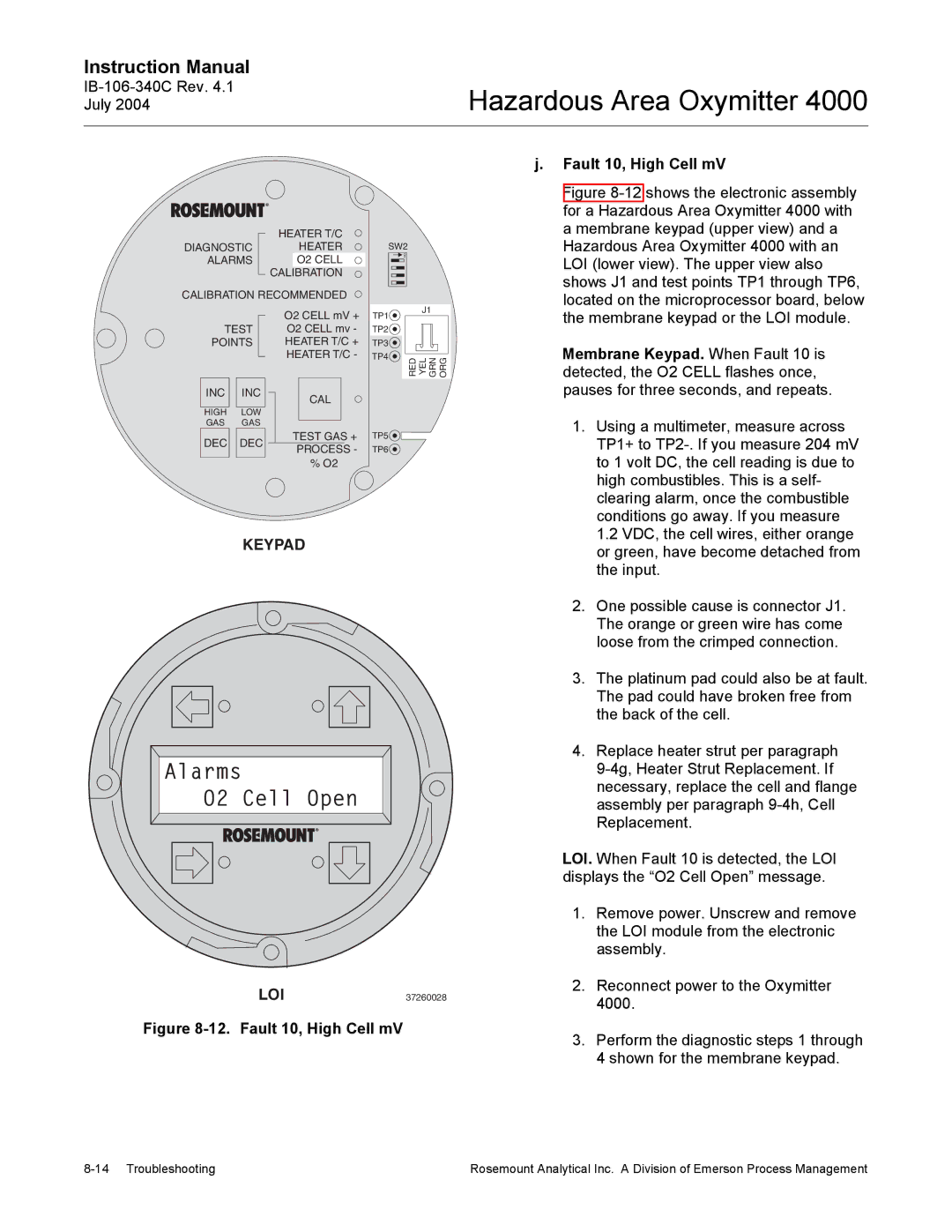Oxymitter
Essential Instructions
Summary
Highlights of Changes
Effective April, 2004 Rev
Effective April, 2004 Rev Summary
Effective July, 2004 Rev
Table of Contents
Hazardous Area Oxymitter
Index
List of Illustrations
List of Tables
Preface
Definitions
Hazardous Area Oxymitter
Belangrijk
Vigtigt
Hazardous Area Oxymitter
Tärkeää
Hazardous Area Oxymitter
Wichtig
Importante
Viktig
Hazardous Area Oxymitter
Hazardous Area Oxymitter
Viktigt
Hazardous Area Oxymitter
Section I. Identification
Section II. Physical Data
Section V. Health Hazard Data
Section VI. Reactivity Data
Section VII. Spill or Leak Procedures
Section IX. Special Precautions
Hazardous Area Oxymitter
Hazardous Area Oxymitter
System Overview
Section Description and Specifications
Component Checklist of Typical System Package Contents
Typical System Package
Imps
System Configuration
Hazardous Area Oxymitter
Remote Mounted
System Features
Membrane Keypad
Hazardous Area Oxymitter
Hart
Autocalibration
Standard
Multiprobe
Option
Logic I/O Regulator Calibration
SPS 4000 Optional
Model 751 Remote Powdered Loop LCD Display
Probe Options
Flame Arrestor Ceramic Diffusion Assembly
Abrasive Shield Assembly
View a View B
Specifications
Hazardous Area Oxymitter 4000 with Remote Electronics
Hazardous Area Certifications
Hazardous Area Oxymitter 4000 with Integral Electronics
Product Matrix
Code Sensing Probe Type with Flame Arrestor
Code Language
Calibration Components
Part Number Description
Selecting Location
Section Installation
Mechanical Installation
Hazardous Area Oxymitter 4000 Probe Installation
DIA Millimeters with Inches in Parentheses
Hazardous Area Oxymitter 4000 Probe with Abrasive Shield
Mounting Plate Outline
Abrasive Shield Mounting
Probe Mounting
Orienting the Optional Vee Deflector
Remote Electronics Mounting
Hazardous Area Oxymitter
Integral Electronics Without SPS
All wiring must conform to local and national codes
Wiring Diagram
Probe
Pneumatic Installation
Reference Air Package
Imps 4000 Connections
SPS 4000 Connections
Hazardous Area Oxymitter
Verify Mechanical Installation
General
Verify Hazardous Area Oxymitter 4000 Configuration
SW2
Defaults Hazardous Area Oxymitter 4000 with Membrane Keypad
Logic I/O Configuration as set at HART/AMS or LOI Mode
Alarm
Calibration Handshake Signal
Logic I/O
Calibration
Hazardous Area Oxymitter
Electronics Housing Terminals with LOI
Verify Hazardous Area Oxymitter 4000 Configuration
Defaults Hazardous Area Oxymitter 4000 with LOI
Logic I/O
Recommended Configuration
MA Signal Upon Critical Alarm
Hazardous Area Oxymitter
Startup Display
Power UP
Error
Operating Display
Operation
Keypad
Reference Air
Overview
Normal Operation
Hazardous Area Oxymitter
LOI
O2 0.00% LK warm up 367dgC
O2 2.59% LK normal
Start UP Oxymitter 4000 Calibration
LOI Features
Lockout
LOI Menu Tree
Local Operator Interface Menu Tree Sheet 1
Hazardous Area Oxymitter 4000 Setup AT the LOI
SYSTEM/Calibration Setup
SYSTEM/Input/Output
SYSTEM/Parameters
SYSTEM/Software
LOI Installation
SYSTEM/Status
Sensor Data
LCD Display Optional
Model 751 Remote Powered Loop
Oxymitter 4000 Test Points
Hazardous Area Oxymitter
Overview
Hart Communicator Signal Line
Section HART/AMS
Connections
Signal Line Connections, ≥ 250 Ohms Load Resistance
Hart Communicator PC Connections
OFF-LINE and ON-LINE Operations
Logic I/O Configuration as set at HART/AMS or LOI
Mode Configuration
HART/AMS Menu Tree Sheet 1
HART/AMS Menu Tree Sheet 2
HART/AMS Menu Tree Sheet 3
Hart Communicator O2 CAL Method
Complete CAL Recommended Apply GAS GAS 1 Flow
Defining a Timed Calibration VIA Hart
O2 Calibration
Hazardous Area Oxymitter
Section Troubleshooting
EMFmV
Alarm Indications
Indications
Alarm Contacts
Identifying and Correcting Alarm
Flashes Status MA Line Fault Clearing
LED
Membrane Keypad. When Fault 1 is
Alarms O2 T/C Open
Fault 1, Open Thermocouple
Keypad
Membrane Keypad. When Fault 2 is
Alarms O2 T/C Shorted
Fault 2, Shorted Thermocouple
Or Faulty PC Board
Alarms O2 T/C Reversed
Fault 3, Reversed Thermocouple Wiring
Membrane Keypad. When Fault 3 is
Alarms ADC Error
Fault 4, A/D Comm Error
Membrane Keypad. When Fault 5 is
Alarms O2 Heater Open
Fault 5, Open Heater
Membrane Keypad. When Fault 6 is
Alarms Very Hi O2 Temp
Fault 6, High High Heater Temp
Membrane Keypad. When Fault 7 is
Alarms Board Temp Hi
Fault 7, High Case Temp
Membrane Keypad. When Fault 8 is
Alarms O2 Temp Low
Fault 8, Low Heater Temp
Membrane Keypad. When Fault 9 is
Alarms O2 Temp Hi
Fault 9, High Heater Temp
Membrane Keypad. When Fault 10 is
Alarms O2 Cell Open
Fault 10, High Cell mV
Membrane Keypad. When Fault 11 is
Alarms O2 Cell Bad
Fault 11, Bad Cell
Fault 12, EEprom Corrupt
Membrane Keypad. When Fault 12 is
Fault 13, Invalid Slope
Membrane Keypad. When Fault 13 is
Fault 14, Invalid Constant
Membrane Keypad. When Fault 14 is
Membrane Keypad. When Fault 15 is
Alarms Calib Failed
Fault 15, Last Calibration Failed
How do I detect a plugged diffuser?
Probe passes calibration, but still ap- pears to read high
Probe passes calibration, but still appears to read low
Can I calibrate a badly plugged diffuser?
Calibration Record For Rosemount Analytical In Situ O2 Probe
Section Maintenance and Service
Calibration Hazardous Area Oxymitter 4000 with Keypad
Installed in a safe area
Hazardous Area Oxymitter
Alarms
Manual Calibration
Calibration Hazardous Area
Oxymitter 4000 with LOI
Cal Constants Results of the Calibration
Purgexxxxs
Abort Calibration
Calibration Status
Hazardous Area Oxymitter 4000 Repair
Integral
Probe Head
Electronic Assembly
J8 Connector
Terminal Block Replacement See -3or Figure
Fuse Location
Hazardous Area Oxymitter
Heater Strut Assembly
Cell Replacement Kit
10. Ceramic Diffuser Element Replacement
Hazardous Area Oxymitter
Contact and Thermocouple Assembly
11. Contact and Thermocouple Assembly Replacement
Section Return of Material
Hazardous Area Oxymitter
Section Replacement Parts
Hazardous Area Oxymitter 4000July
Replacement Parts for Probe Part Number Description Index No
Probe Disassembly Kit
Hazardous Area Oxymitter
Hart Handheld 375 Communicator
Section Optional Accessories
Asset Management Solutions AMS
BY-PASS Packages
Imps 4000 Intelligent Multiprobe Test GAS Sequencer
SPS 4000 Single Probe Autocalibration Sequencer
O2 Calibration GAS
Hazardous Area Oxymitter
Section Index
Hazardous Area Oxymitter
Warranty
Hazardous Area Oxymitter Serial no Order no

![]() TP2
TP2![]() TP3
TP3![]() TP4
TP4![]()
![]() TP6
TP6![]()
